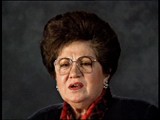You searched for: 成都谷歌优化怎么做【TG飞机:@bapingseo】基里巴斯facebook群发【TG电报:@bapingseo】微盘盘源码定制【Telegram:@bapingseo】ag街机网址pg麻将胡了2?p1FhyE/M3m6Du.html
<< Previous | Displaying results 576-600 of 653 for "成都谷歌优化怎么做【TG飞机:@bapingseo】基里巴斯facebook群发【TG电报:@bapingseo】微盘盘源码定制【Telegram:@bapingseo】ag街机网址pg麻将胡了2?p1FhyE/M3m6Du.html" | Next >>
-
Rescue
ArticleRescue efforts during the Holocaust ranged from the isolated actions of individuals to organized networks both small and large.
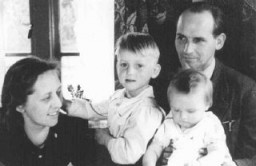
-
Ardeatine Caves Massacre
ArticleNow a national memorial site, the Ardeatine Caves outside Rome were the site of a German reprisal for a bombing by Italian resistance operatives in March 1944.
-
Jewish Aid and Rescue
ArticleJewish groups worldwide helped rescue thousands during the Holocaust. Read more about efforts to save Jews from Nazi persecution and death.
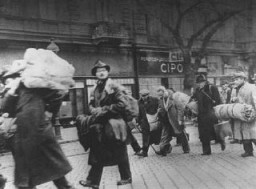
-
Collections Highlight: Selma Schwarzwald and her Bear, "Refugee"
ArticleWhile living under an assumed identity after escaping from the Lvov ghetto, Selma Schwarzwald received a toy bear that she kept with her for many years. Read about Refugee the bear.
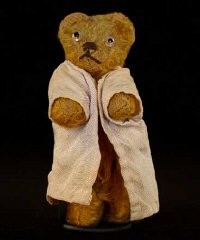
-
Paul von Hindenburg
ArticlePaul von Hindenburg was President of the Weimar Republic from 1925 until his death in 1934. Learn more about his life and role in the Nazi rise to power.
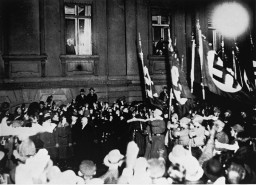
-
Genocide Timeline
ArticleKey dates in the use of the term genocide as part of the political, legal, and ethical vocabulary of responding to widespread threats of violence against groups.

-
Berlin-Marzahn (camp for Roma)
ArticleThe Berlin-Marzahn camp was established a few miles from Berlin's city center, for the detention of Roma, on the eve of the 1936 summer Olympics.
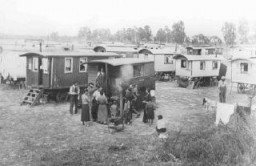
-
Public Humiliation
ArticleThe Nazis used public humiliation tactics to degrade their victims and to reinforce Nazi racial ideology for German citizens and populations under Nazi occupation.
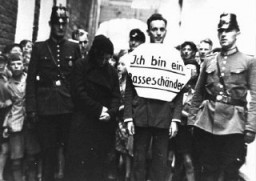
-
"Degenerate" Art
ArticleNazi leaders sought to control all spheres of German society, including art. They labeled art that did not meet the regime's criteria "degenerate." Learn more.
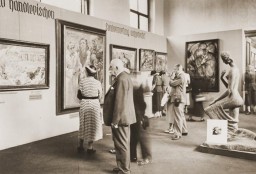
-
Communism
ArticleCommunist ideas spread rapidly in Europe during the 19th and 20th centuries, offering an alternative to both capitalism and far-right fascism and setting the stage for a political conflict with global repercussions.
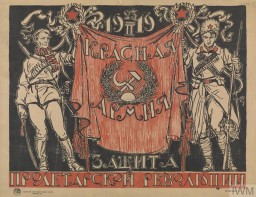
-
War Refugee Board: Activities
ArticleThe War Refugee Board was a significant US attempt to rescue and relieve Jews and other endangered people under German occupation. Learn about its activities.
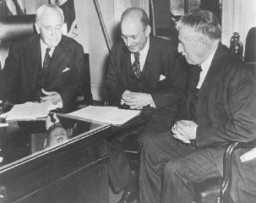
-
Esterwegen Concentration Camp
ArticleEsterwegen was part of the Nazi regime’s early system of concentration camps, created to hold people arrested as opponents of the new regime.
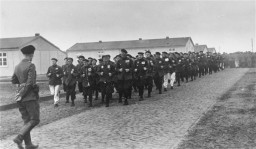
-
Jacob Wiener
ArticleExplore Jacob Wiener’s biography and learn about his experiences during Kristallnacht in Würzburg, Germany.
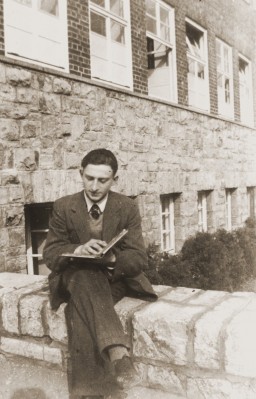
-
Norbert Wollheim describes deportation from Berlin
Oral HistoryNorbert studied law and was a social worker in Berlin. He worked on the Kindertransport (Children's Transport) program, arranging to send Jewish children from Europe to Great Britain. His parents, who also lived in Berlin, were deported in December 1942. Norbert, his wife, and their child were deported to Auschwitz in March 1943. He was separated from his wife and child, and sent to the Buna works near Auschwitz III (Monowitz) for forced labor. Norbert survived the Auschwitz camp, and was liberated by US…
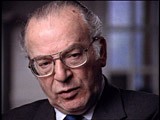
-
Lucine Horn describes obtaining false papers to assume the identity of an "Aryan" outside the Warsaw ghetto
Oral HistoryLucine was born to a Jewish family in Lublin. Her father was a court interpreter and her mother was a dentist. War began with the German invasion of Poland on September 1, 1939. Lucine's home was raided by German forces shortly thereafter. Soon after the German occupation of Lublin, Jews there were forced to wear a compulsory badge identifying them as Jews. A ghetto in Lublin was closed off in January 1942. Lucine survived a series of killing campaigns and deportations from the ghetto during March and…
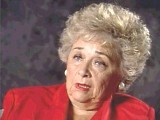
-
David (Dudi) Bergman describes being rescued by inmates before he could be taken to the Dachau crematorium
Oral HistoryThe Germans occupied David's town, previously annexed by Hungary, in 1944. David was deported to Auschwitz and, with his father, transported to Plaszow. David was sent to the Gross-Rosen camp and to Reichenbach. He was then among three of 150 in a cattle car who survived transportation to Dachau. He was liberated after a death march from Innsbruck toward the front line of combat between US and German troops.
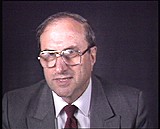
-
Colonel Richard R. Seibel describes food distribution after liberation of the Mauthausen camp
Oral HistoryIn June 1941, Richard was ordered to active duty in the US Army. After a period of training, he was sent to Europe. He entered Austria in April 1945. A patrol came upon the Mauthausen camp and Richard was appointed to take command of the camp. He organized those inmates who had survived in the camp until liberation in May 1945, and brought in two field hospitals. After 35 days in Mauthausen, he was transferred to a post in the Austrian Alps.
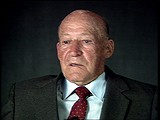
-
Walter Meyer describes his 1943 trial for looting, and the impact of his role in the Edelweiss Pirates on the sentence he received
Oral HistoryWalter was born in Kassel, north central Germany, but grew up in the Rhineland. As a youth, Walter questioned the German superiority and antisemitism he was taught. His father, an anti-Nazi, refused to allow Walter to enter one of the Adolf Hitler Schools, but did permit him to join the Hitler Youth. However, Walter's rebellious streak led him to hide a Jewish friend in his basement. He also formed a gang that played pranks on young Nazis and helped French prisoners of war. They called themselves Edelweiss…
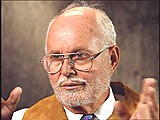
-
William (Bill) Lowenberg describes Zionist and cultural activities in the Westerbork camp
Oral HistoryAs a boy, Bill attended school in Burgsteinfurt, a German town near the Dutch border. After the Nazis came to power in Germany in January 1933, Bill experienced increasing antisemitism and was once attacked on his way to Hebrew school by a boy who threw a knife at him. In 1936, he and his family left Germany for the Netherlands, where they had relatives and thought they would be safe. However, after Germany invaded the Netherlands in May 1940, antisemitic legislation--including the order to wear the Jewish…
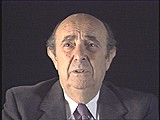
-
Thomas Buergenthal describes the charges brought at the International Military Tribunal at Nuremberg
Oral HistoryJudge Thomas Buergenthal was one of the youngest survivors of the Auschwitz and Sachsenhausen concentration camps. He immigrated to the United States at the age of 17. Judge Buergenthal devoted his life to international and human rights law. He served as chairman of the United States Holocaust Memorial Museum’s Committee on Conscience; was named the Lobingier Professor of Comparative Law and Jurisprudence at the George Washington University Law School; and served for a decade as the American judge at…
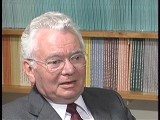
-
Thomas Buergenthal describes differing perspectives on international justice
Oral HistoryJudge Thomas Buergenthal was one of the youngest survivors of the Auschwitz and Sachsenhausen concentration camps. He immigrated to the United States at the age of 17. Judge Buergenthal devoted his life to international and human rights law. He served as chairman of the United States Holocaust Memorial Museum’s Committee on Conscience; was named the Lobingier Professor of Comparative Law and Jurisprudence at the George Washington University Law School; and served for a decade as the American judge at…
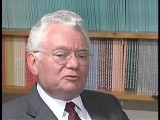
-
Thomas Buergenthal describes the plight of refugees today
Oral HistoryJudge Thomas Buergenthal was one of the youngest survivors of the Auschwitz and Sachsenhausen concentration camps. He immigrated to the United States at the age of 17. Judge Buergenthal devoted his life to international and human rights law. He served as chairman of the United States Holocaust Memorial Museum’s Committee on Conscience; was named the Lobingier Professor of Comparative Law and Jurisprudence at the George Washington University Law School; and served for a decade as the American judge at…
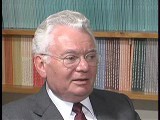
-
Thomas Buergenthal discusses whether it is ever too late to seek justice
Oral HistoryJudge Thomas Buergenthal was one of the youngest survivors of the Auschwitz and Sachsenhausen concentration camps. He immigrated to the United States at the age of 17. Judge Buergenthal devoted his life to international and human rights law. He served as chairman of the United States Holocaust Memorial Museum’s Committee on Conscience; was named the Lobingier Professor of Comparative Law and Jurisprudence at the George Washington University Law School; and served for a decade as the American judge at…
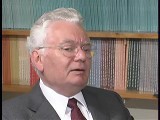
-
Sandor (Shony) Alex Braun describes the death of his father in Kochendorf, a subcamp of Natzweiler
Oral HistoryShony was born to religious Jewish parents in a small Transylvanian city. He began to learn the violin at age 5. His town was occupied by Hungary in 1940 and by Germany in 1944. In May 1944, he was deported to the Auschwitz camp in Poland. He was transferred to the Natzweiler camp system in France and then to Dachau, where he was liberated by US troops in April 1945. In 1950, he immigrated to the United States, and became a composer and a professional violinist.
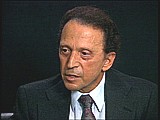
-
Charlene Schiff describes a clandestine school for children in the Horochow ghetto
Oral HistoryBoth of Charlene's parents were local Jewish community leaders, and the family was active in community life. Charlene's father was a professor of philosophy at the State University of Lvov. World War II began with the German invasion of Poland on September 1, 1939. Charlene's town was in the part of eastern Poland occupied by the Soviet Union under the German-Soviet Pact of August 1939. Under the Soviet occupation, the family remained in its home and Charlene's father continued to teach. The Germans…
